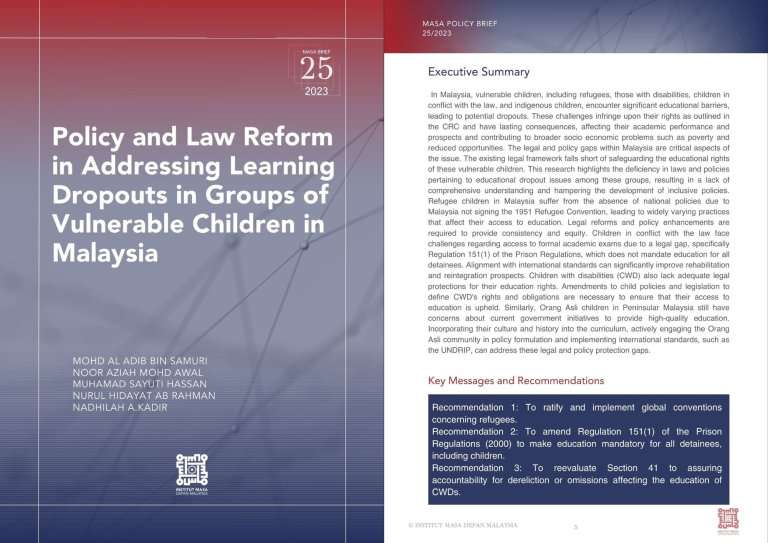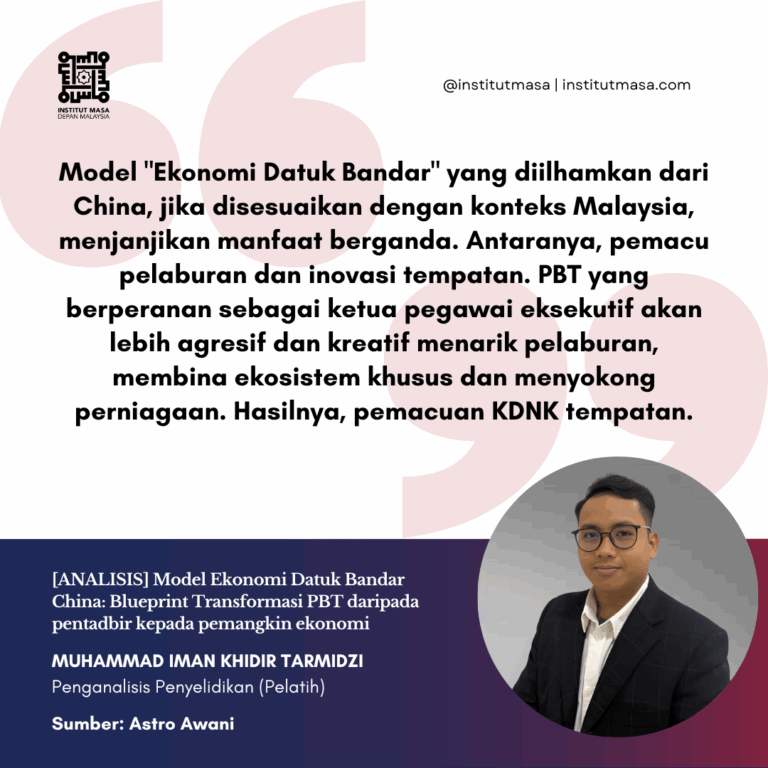IN Malaysia, vulnerable children, including refugees, those with disabilities, children in conflict with the law, and indigenous children, encounter significant educational barriers, leading to potential dropouts. These challenges infringe upon their rights as outlined in the CRC and have lasting consequences, affecting their academic performance and prospects and contributing to broader socio economic problems such as poverty and reduced opportunities. The legal and policy gaps within Malaysia are critical aspects of the issue. The existing legal framework falls short of safeguarding the educational rights of these vulnerable children. This research highlights the deficiency in laws and policies pertaining to educational dropout issues among these groups, resulting in a lack of comprehensive understanding and hampering the development of inclusive policies. Refugee children in Malaysia suffer from the absence of national policies due to Malaysia not signing the 1951 Refugee Convention, leading to widely varying practices that affect their access to education. Legal reforms and policy enhancements are required to provide consistency and equity. Children in conflict with the law face challenges regarding access to formal academic exams due to a legal gap, specifically Regulation 151(1) of the Prison Regulations, which does not mandate education for all detainees. Alignment with international standards can significantly improve rehabilitation and reintegration prospects. Children with disabilities (CWD) also lack adequate legal protections for their education rights. Amendments to child policies and legislation to define CWD’s rights and obligations are necessary to ensure that their access to education is upheld. Similarly, Orang Asli children in Peninsular Malaysia still have concerns about current government initiatives to provide high-quality education. Incorporating their culture and history into the curriculum, actively engaging the Orang Asli community in policy formulation and implementing international standards, such as the UNDRIP, can address these legal and policy protection gaps.
#25: Policy and Law Reform in Addressing Learning Dropouts in Groups of Vulnerable Children in Malaysia
- MASA Policy Development Programme, Policy Brief
Share Article
More Article
Article
By Muhammad Iman Khidir Tarmidzi Dalam struktur pentadbiran Malaysia, pihak berkuasa tempatan (PBT)...
Article
By Solahuddiin Ismail Mina Jangka hayat ketika lahir adalah satu anggaran purata umur...
Article
By Mohamad Fauzi Ahmad Meskipun ekonomi Malaysia bergantung pada permintaan domestik, sumbangan bumiputera...
Article
By Muhammad Iman Khidir Tarmidzi Siswazah muda dalam dekad kebelakangan ini, terperangkap dalam...
Article
By Muhammad Iman Khidir Tarmidzi Dalam struktur pentadbiran Malaysia, pihak berkuasa tempatan (PBT)...
Article
By Solahuddiin Ismail Mina Jangka hayat ketika lahir adalah satu anggaran purata umur...
Article
By Mohamad Fauzi Ahmad Meskipun ekonomi Malaysia bergantung pada permintaan domestik, sumbangan bumiputera...
Article
By Muhammad Iman Khidir Tarmidzi Siswazah muda dalam dekad kebelakangan ini, terperangkap dalam...
Article
By Muhammad Iman Khidir Tarmidzi Dalam struktur pentadbiran Malaysia, pihak berkuasa tempatan (PBT)...




